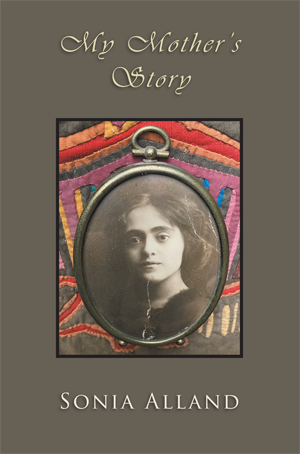Page last updated: February 24, 2021
All pages copyright © 2021 by Pinyon Publishing

My Mother’s Story
by Sonia Alland
Documenting an immigrant family from the early 20th century, Sonia Alland addresses sensitive psychological threads and transformations as she observes her family with tender objectivity. With this daughter’s buoyant narration, we meet the central figure, Alland’s mother, Rose, and then we branch out into the family and loop back again. Clear, concise, gentle, and patient—never burdened by superfluous or sentimental details—stories of many people are braided into a cohesive, succinct story.
Alland allows herself and her family to be vulnerable to our viewing. With the narrator, we acknowledge mystery and in that discover perhaps something about our own psychologies—our desires to know or not to know. By watching the narrator unpeel layers of human behaviors, we may come to see that looking into our families may neither be as threatening nor as obvious as it might feel at first. Perhaps we might even discover peace where formerly there lived fear or hurt.
“As I write this, I’m beginning to see my mother differently. The clever strategy she devised to prevent the effects of age from spoiling an enjoyable experience with her son, reminds me of other occasions in her past. She was an unhappy victim of my father’s harshness. True enough. But underneath her sadness was a strength invisible to me. How could I perceive that somewhere in her was that hardy 11-year-old determined to measure up to the demands put on her … Only now, looking back on her life, do I realize that the image of my mother as a helpless victim was sorely limited. What was essential—her ingenuity, her resilience—was missing.”
 Sonia Alland translates from the French and the Catalan: She has translated works by the French writer, Marie Bronsard, and the poetry in French by Salah Al Hamdani. From the Catalan, Ms. Alland has done Maria Mercè Roca’s memoir and a selection of her short stories and is translating selected poems by the Catalan poets, Salvador Espriu and Narcis Comadira.
Sonia Alland translates from the French and the Catalan: She has translated works by the French writer, Marie Bronsard, and the poetry in French by Salah Al Hamdani. From the Catalan, Ms. Alland has done Maria Mercè Roca’s memoir and a selection of her short stories and is translating selected poems by the Catalan poets, Salvador Espriu and Narcis Comadira.